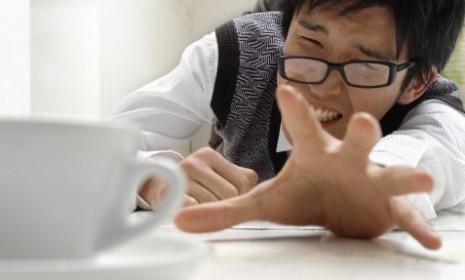Why coffee doesn't work
A new study says that coffee drinkers don't actually get a boost in the morning — they just return to pre-addiction levels of alertness. Time to kick the habit?

A free daily email with the biggest news stories of the day – and the best features from TheWeek.com
You are now subscribed
Your newsletter sign-up was successful
Think that morning cup of coffee makes you more alert? Think again. According to Peter Rogers at Britain's Bristol University, your first cup of joe, at best, just gets you back to the normal alertness level of non-caffeine addicts. What does this study tells us about "the most commonly used drug in the world," and its most devoted users?
How did the study work?
Rogers and his team asked 379 participants to abstain from caffeine for 16 hours, then gave half of them caffeine pills and half of them placebos. Both heavy and low caffeine users were more alert after taking the caffeine pills (equivalent to 1-2 cups, then 2-3 cups' worth an hour and a half later) — but none of them were more alert than non-caffeine users who took the placebo. Heavy caffeine users who got placebos had the lowest levels of alertness.
The Week
Escape your echo chamber. Get the facts behind the news, plus analysis from multiple perspectives.

Sign up for The Week's Free Newsletters
From our morning news briefing to a weekly Good News Newsletter, get the best of The Week delivered directly to your inbox.
From our morning news briefing to a weekly Good News Newsletter, get the best of The Week delivered directly to your inbox.
What did the researchers conclude from that?
That your morning cup of coffee merely reverses "the fatiguing effects of acute caffeine withdrawal," rather than boosting your alertness above "normal" levels. Or, as Britain's Daily Telegraph puts it, "the so-called 'caffeine high' is just a reaction to the body craving the drug."
How bad can those cravings be?
The heavy coffee drinkers in the placebo group not only felt sluggish, they also had increased headaches. Four had to drop out of the study because their headaches were so severe.
A free daily email with the biggest news stories of the day – and the best features from TheWeek.com
Did the researchers look at anything else?
Yes: Anxiety, a common side-effect of caffeine. Light caffeine drinkers reported an increase in anxiety after taking the drug. Heavy caffeine drinkers were immune from the anxiety boost. The researchers also found that subjects who were genetically predisposed to anxiety (those having a specific variant of the ADORA2A gene), drank more coffee on average. This suggests that a mild increase in anxiety "may be a part of the pleasant buzz caused by caffeine," Rogers says.
Does this mean people should stop, or start, drinking coffee?
"If you find that you're just as alert as you were before your caffeinated days, maybe it's time to switch to orange juice," says Whitson Gordon in Lifehacker. But Dr. Peter Martin at Vanderbilt University notes that other studies show coffee and tea to have health benefits, adding: "No one is going to change what they do, and there's no reason to change." As for Rogers, he just advises, "It's better to stick with it or keep off it altogether."
Sources: Reuters, HealthDay, Guardian, Lifehacker, Daily Telegraph
-
 Film reviews: ‘Wuthering Heights,’ ‘Good Luck, Have Fun, Don’t Die,’ and ‘Sirat’
Film reviews: ‘Wuthering Heights,’ ‘Good Luck, Have Fun, Don’t Die,’ and ‘Sirat’Feature An inconvenient love torments a would-be couple, a gonzo time traveler seeks to save humanity from AI, and a father’s desperate search goes deeply sideways
-
 Political cartoons for February 16
Political cartoons for February 16Cartoons Monday’s political cartoons include President's Day, a valentine from the Epstein files, and more
-
 Regent Hong Kong: a tranquil haven with a prime waterfront spot
Regent Hong Kong: a tranquil haven with a prime waterfront spotThe Week Recommends The trendy hotel recently underwent an extensive two-year revamp